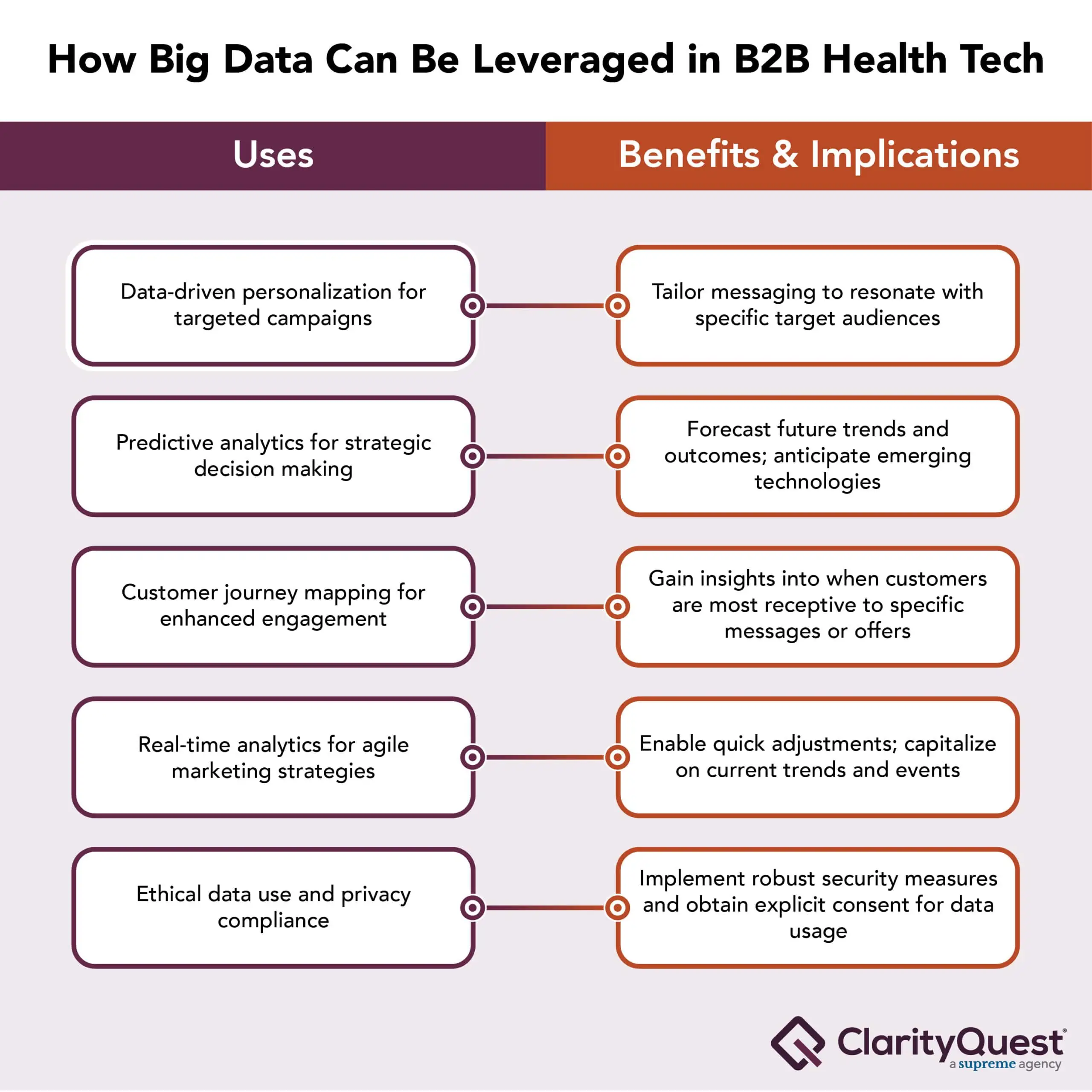As B2B healthcare software marketing continues to embrace digital transformation, leveraging big data is one of the most important strategies at our disposal.
Strategically leveraging this vast pool of information can revolutionize how companies approach marketing, providing unparalleled insights into customer behaviors, preferences, and trends.
B2B health tech companies can effectively harness big data for targeted marketing campaigns and customer insights. Let’s explore five key strategies.
Understanding the big data landscape in B2B health tech
But before diving into the strategies, it’s essential to grasp the magnitude of big data in the B2B health tech space.
Big data in this context encompasses a plethora of information, including electronic health records (EHRs), patient data, clinical trial results, and market trends. Analyzing this data can uncover patterns, correlations, and hidden insights that traditional marketing approaches might miss.
1. Data-driven personalization for targeted campaigns
One of the key advantages of leveraging big data is it can enable highly personalized marketing campaigns. By analyzing customer behaviors and preferences, B2B health tech companies can tailor their messaging to resonate with specific target audiences.
For example, if a healthcare provider consistently engages with content related to telehealth solutions, a personalized email campaign highlighting the benefits of a specific telehealth platform could be more effective than a generic message.
Additionally, leveraging machine learning algorithms can enhance personalization by predicting future behaviors based on historical data. This allows marketers to anticipate customer needs and deliver targeted content at the right time, increasing the likelihood of conversion.
2. Predictive analytics for strategic decision-making
Powered by big data, predictive analytics empowers B2B health tech marketers to make informed campaign decisions. Predictive analytics can forecast future trends and outcomes by analyzing historical data and identifying patterns.
For instance, it can predict which channels are most effective for reaching a particular audience, helping marketers allocate resources more efficiently.
In the context of health tech, predictive analytics can also be utilized to anticipate market trends and emerging technologies. This foresight allows companies to position themselves as industry leaders, offering solutions that align with the evolving needs of healthcare providers and professionals.
3. Customer journey mapping for enhanced engagement
Understanding the customer journey is crucial for creating effective marketing strategies. Big data enables B2B health tech companies to map the entire customer journey, from initial awareness to conversion and beyond.
By analyzing touchpoints and interactions, marketers gain insights into the stages where customers are most receptive to specific messages or offers.
For example, suppose big data reveals that healthcare professionals often seek educational content during the research phase. In that case, B2B marketers can develop targeted content such as whitepapers, webinars, or case studies to address these informational needs. This not only enhances engagement but also builds trust and credibility.
4. Real-time analytics for agile marketing strategies
In the dynamic landscape of health tech, real-time analytics is a game-changer. Big data allows marketers to monitor campaign performance in real-time, enabling quick adjustments and optimizations.
If a particular channel or message is not resonating as expected, real-time analytics provide the agility to pivot strategies swiftly.
Additionally, real-time analytics can be leveraged to capitalize on current trends and events. For example, during a public health crisis, health tech companies can use real-time data to tailor their messaging to address specific concerns or challenges healthcare providers face.
5. Ethical data use and privacy compliance
As we harness the power of big data, it’s paramount to prioritize ethical data use and comply with privacy regulations such as HIPAA in the healthcare sector.
Customer trust is a cornerstone of successful marketing strategies, and mishandling sensitive health data can have severe consequences. Implementing robust security measures, obtaining explicit consent for data usage, and regularly auditing data practices are essential components of ethical big data utilization.
A data-driven future for B2B health tech marketing
Integrating big data in B2B health tech marketing represents a paradigm shift in how companies engage with their target audiences.
Health tech companies can create more impactful and targeted marketing campaigns by embracing data-driven personalization, predictive analytics, customer journey mapping, real-time analytics, and ethical data use.
The era of personalized, agile, and insight-driven marketing is here, and those who leverage the power of big data will undoubtedly lead the way in the B2B health tech space.



